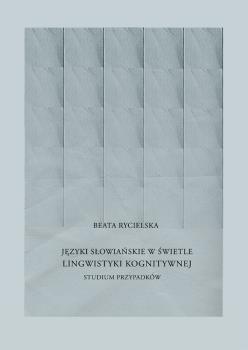Języki słowiańskie w świetle lingwistyki kognitywnej : studium przypadków
Keywords:
network model, imagery / construal, conceptual metaphor, translationSynopsis
SLAVIC LANGUAGES IN THE LIGHT OF COGNITIVE LINGUISTICS: CASE STUDY
This monograph presents material of the Russian and Polish languages, which is discussed in the perspective of Ronald W. Langaker’s cognitive grammar and the conceptual metaphor theory of George Lakoff and Mark Johnson.
The subject of the analysis are prefixes, reflexive morpheme, prepositions used with the accusative and locative cases, the dative case in impersonal constructions with reflexive verb. The object of research are also selected universal conceptual categories, metaphors described on the basis of poetic works of eminent Russian and Polish authors and their translations. Finally, the subject of knowledge are language units discussed as iconic signs. Taken from the diary of Mikhail and Elena Bulhakow, they draw attention to themselves, being elements of epistolary texts.
The categories described in this monograph arouse interest as a source of knowledge about the universal cognitive abilities of language users, about ways to conceptualize reality reflected in language, the cultural specificity of languages, and the peculiarities of the poetics of selected authors.
Chapters
-
TABLE OF CONTENTS
-
Podstawowe założenia językoznawstwa kognitywnego .......... 7
-
STUDIUM PRZYPADKÓW
-
Prefiksy werbalne .......... 25
-
Afiks zwrotny -ся .......... 75
-
Przypadki gramatyczne .......... 105
-
Metafora pojęciowa .......... 125
-
Metafora pojęciowa i przekład .......... 137
-
Ikoniczny charakter języka .......... 173
-
Zakończenie .......... 187
-
Literatura .......... 193
-
Indeks nazwisk .......... 209
-
Wykaz rysunków .......... 215
Downloads
References





